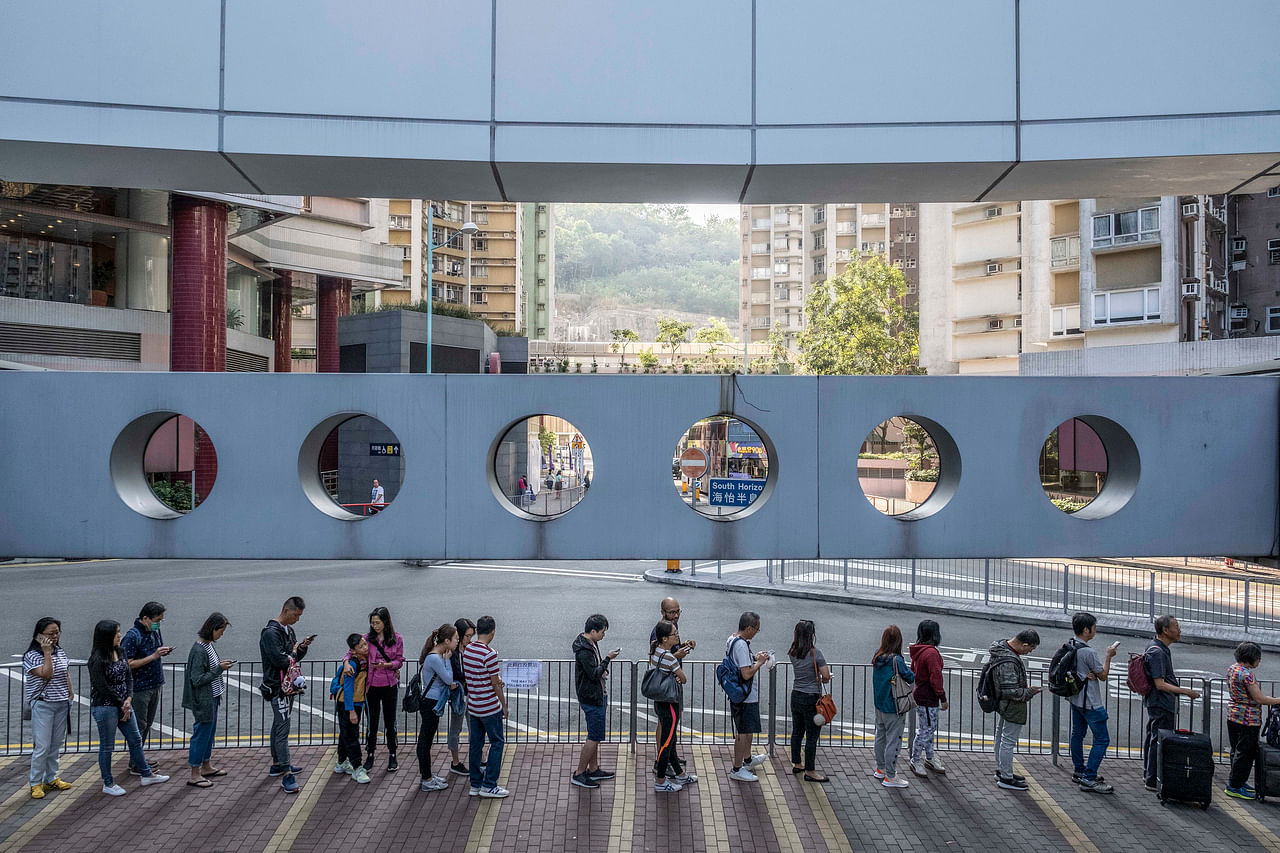HONG KONG (NYTIMES) - When Hong Kong's pro-democracy politicians won a resounding victory in local council elections in 2019, they inspired hopes of democratic change. Now, fears of arrest have driven most of them to quit, laying bare that dream's dramatic collapse.
The opposition had swept nearly 90 per cent of the 452 seats in Hong Kong's district councils, riding on widespread anti-government sentiment that had turned into months of protests.
Though the polls were for the lowest rung of elected office, they were regarded as an informal referendum that showed the public's support for the pro-democracy camp. The victory dealt a stinging defeat to Beijing and raised the opposition's expectations that even greater electoral successes were within reach.
But in less than two years, Beijing has struck back, demolishing those gains as part of a broader security crackdown that has drastically raised the risk of political dissent.
More than half of the council members from the pro-democracy camp, more than 250 of them, have quit in recent weeks to avoid being ensnared in Beijing's campaign. Those who remain are worried about being arrested.
"Before, we had a lot of hope and anticipation. Now, it feels like our hands and feet are tied," said Zoe Chow, an elected district official who had represented the working-class neighbourhood of Sham Shui Po since 2015 before resigning in July.
"We have to think very hard about what to do next because it feels as though everything we do is considered wrong."
By targeting opposition figures in local councils, the authorities are effectively burying the last vestige of democracy in Hong Kong. Dozens of politicians are in jail and facing potential life sentences on national security charges.
Apple Daily, a major pro-democracy newspaper, has been forced to close after the arrest of its founder and top editors. Hong Kong's largest teachers union and the Civil Human Rights Front, which organised large protest marches, both said in recent days that they would disband. Beijing has rewritten the rules for future elections to bar candidates it deems disloyal.
The district councilors said they were alarmed by the government's plans to impose a new loyalty oath on them and reports that perceived violations could leave them imprisoned, barred from politics or bankrupted.
District councilors are not usually in the political limelight. They handle unglamorous tasks such as dealing with pest infestations, overflowing trash and illegal parking. They help residents with everyday problems such as the payment of bills or economic aid.
But in 2019, when the city was consumed with anti-government protests, the councils took on outsize political importance. Many first-time candidates campaigned on issues raised by the protesters, even though the councils have little say on questions of police accountability or universal suffrage.
After the opposition swept up the bulk of the seats, Beijing ordered, as part of a sweeping national security law, that anyone who assumed public office must swear allegiance to the Hong Kong government and its laws. The new condition was widely seen as paving the way to disqualifying the government's critics.
"It was only when so many radicals got on to the district councils through the 2019 election did the problems arise," according to Lau Siu-kai, a senior adviser to Beijing on Hong Kong affairs.
Beijing has said only patriots are allowed to run the city. It has applied vague definitions to what it means to break an oath of loyalty to the government. Last year, it ordered the ouster of four opposition leaders in Hong Kong from the city's legislature for expressing support for US sanctions against Hong Kong's officials. The remainder of the pro-democracy camp in the legislature then resigned in protest.

The government has not told the district councilors what consequences they may face for breaching the oath, or even when they are supposed to take it. But the city's pro-Beijing news outlets carried reports warning that district councilors found infringing the oath could be forced to repay two years of salary and expenses. They also cited officials as warning that district councilors who had displayed protest slogans in their offices could be targeted.
The exodus also follows months of tensions with city officials and pro-Beijing politicians. Many democrats wanted to use their platforms as district councilors to pressure the government on political issues. When they raised complaints about police conduct, for instance, local officials would sometimes cancel meetings or walk out.
Some pro-government district council members have criticized the opposition representatives' approach as unproductive.
Lam Kong-kwan, one of two establishment representatives on the Sha Tin district council, pointed to a statement opposing the national security law that was approved last year by the 17 district councils controlled by the pro-democracy camp, calling it a distraction.
"They always say they are reflecting the will of the people. But what does the will of the people even mean?" Lam added. "The people aren't telling you to oppose the government or oppose central authorities."

But many pro-democracy district council members say the government is unwilling to work with opposition politicians even on public service improvement projects.
Paul Zimmerman, a pro-democracy representative who did not step down, said the Home Affairs Department has not allowed him to approve agendas for committee meetings of the Southern District Council, even though he is now the most senior officer after a wave of resignations.
That will hold up plans for projects like a pedestrian bridge over a bay in the district, he said. He called it part of a campaign "to disempower the district councils."
The government has acknowledged that the resignations have crippled some district councils but said it did not plan to hold elections to fill the empty seats before next July.

